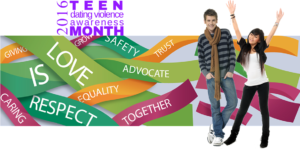 February is Teen Dating Violence Awareness Month. This issue is far more prevalent than people think. In the Unites States one in three teens will experience emotional, sexual, or physical abuse in their relationship with a significant other before reaching adulthood. And when these dysfunctional and toxic interpersonal dynamics are normalized in adolescence they increase the likelihood of being victimized in college and often carry over into adult relationships as well. 22% of adult women and 15% of adult men who are victims of rape, physical violence, or stalking by an intimate partner first experienced some form of dating violence between the ages of 11 and 17 years old.
February is Teen Dating Violence Awareness Month. This issue is far more prevalent than people think. In the Unites States one in three teens will experience emotional, sexual, or physical abuse in their relationship with a significant other before reaching adulthood. And when these dysfunctional and toxic interpersonal dynamics are normalized in adolescence they increase the likelihood of being victimized in college and often carry over into adult relationships as well. 22% of adult women and 15% of adult men who are victims of rape, physical violence, or stalking by an intimate partner first experienced some form of dating violence between the ages of 11 and 17 years old.
The onset of dating violence can often be hard to detect, starting with teasing, name-calling, shaming, disregarding a partner’s needs and feelings, or subtly pressuring a partner sexually. Victims can initially find ways to minimize or even rationalize these behaviors, often blaming themselves for being “overly sensitive,” “too needy” or unnecessarily “prudish.” Yet these are important red flags that often lead to an escalation of behaviors that become more emotionally or sexually abusive and physically violent. Victims can experience being stalked, completely isolated from other friends and family members, being slapped, pinched, punched, hit, or kicked, being forced to engage in sex acts or raped. In addition to “in –person” victimization, in this day and age many abusers harm their partners electronically using social media to engage in cyber-bullying or to post intimate pictures without consent.
Victims of teen dating violence are far more likely to experience depression and anxiety and often turn to drugs, alcohol, food and acts of self-harm to self-medicate, dissociate, or feel numb. They are also more likely to exhibit anti-social behavior and are at increased risk for suicidal ideation and gesturing. Dating violence profoundly impacts self-worth and self-esteem. Many teens are reluctant to report their experiences either because they feel a sense of shame or self-blame, fear reprisals from partners, or assume they will not be believed if they disclose to adults. Bringing this serious issue to light by increasing public awareness, educating teens about the red flags of dating violence, empowering them to speak up and advocate for self-protection and their right to have genuinely safe relationships are the first steps towards reducing a cultural phenomenon that has long-lasting adverse effects for both individuals and society at large.
Find more information on Teen Dating and Violence:
CDC’s Dating Matters: Strategies to Promote Healthy Teen Relationships
National Dating Abuse Helpline and Love is Respect – 866.331.9474 or text 77054
National Domestic Violence Hotline – 800.799.SAFE (7233)
National Sexual Assault Hotline – 800.656.HOPE (4673)
National Sexual Violence Resource Center


Hi! I’ve been following your site for a long time now and finally got the bravery to
go ahead and give you a shout out from Huffman Texas! Just wanted to tell you keep up the excellent job!
Thank you so much for such a thoughtful comment! I’m so glad that you find value in the stories, and appreciate your feedback. All the best to you!